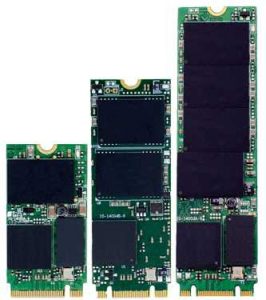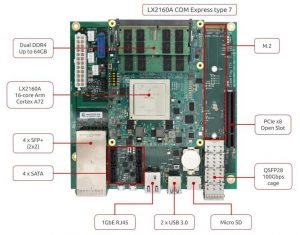SolidRun and Virtium Collaboration to Provide Building Blocks for 5G Connected Future
Offering computing platforms, memory and SSD storage prequalified for compatibility
This is a Press Release edited by StorageNewsletter.com on August 11, 2020 at 2:08 pmThe much-anticipated move to 5G communications has begun and now most industries are working towards building the infrastructure to support the vast coverage and incredible speed that comes with it.
SolidRun Ltd., developer and manufacturer of performance edge computing solutions, and Virtium LLC, provider of industrial-grade SSD and memory solutions, have announced a collaboration to provide the industry with essential building blocks for creating new technologies for the network edge that benefit from 5G.
Solidrun Clearfog Cx Lx2k Rev3
The 2 companies are working together to leverage SolidRun’s CEx7 16-core LX2160A Computer-on-Module and ClearFog CX LX2K network computing platform, and Virtium’s StorFly M.2 SATA industrial-grade SSDs, DDR4 memory modules and StorKit SSD software, to usher in the next generation of edge-computing solutions that emphasize speed, connectivity, efficiency and data security across 5G networks.
StorFly M.2 SATA industrial-grade SSDs

“We see many industries looking to the near-zero latency of 5G as being the key to unlocking the true potential of Industrial IoT, but to benefit from these speeds, having the right hardware is critical,” said Atai Ziv, CEO, SolidRun. “We saw an opportunity to create a variety of solutions ranging from computer on modules and carrier boards to rack-mount Arm servers that will expedite the proliferation of 5G across the entire ecosystem. Additionally, we’re teaming up with key industry players, like Virtium, to ensure that our systems are paired with storage solutions that won’t bottleneck data processing speeds or compromise data security.”
“5G’s unprecedented bandwidth will dramatically increase the demand for industrial-grade solid-state storage throughout the network infrastructure – especially at the edge, where low latency, high endurance and rock-solid security are imperative,” said Jacques Issa SVP, strategic marketing, Virtium. “Collaborating with SolidRun as we have to develop complete solutions – edge-computing platforms with already-qualified SSDs, integrated software and memory – will help meet that demand and unleash the power and promise of 5G at the network edge.“
Poised to deliver as much as a 2,000% increase in network speed and support for up to 10x more device connections than 4G, all while reducing total network power consumption, 5G is expected to bring IoT to new levels and boost the role data plays in society. According to a recent Ericsson Mobility Report, 190 million 5G subscriptions are expected by the end of 2020 and forecasted to grow to 2.8 billion in 2025, representing approximately 30% of total mobile subscriptions.
The speed and widespread coverage promised by 5G is poised to revolutionize several industries, including manufacturing, logistics, farming/agriculture, communications, industrial automation, healthcare, and energy. It will lay the framework for truly smart cities and usher in the age of autonomous transportation.
To design the systems needed to proliferate 5G across the entire ecosystem, hardware solutions that create, route or consume data at 5G speeds must be optimized for reliable transfer of data at fast rates and be protected vs. data loss from power failure, but must also offer a new level of security. Beyond how data is handled, these systems must also operate at low power and fit within form factor constraints all while still maintaining exceptional resilience to harsh environmental factors like heat, shock and vibration. These are value propositions that SolidRun and Virtium are each known for. Together, the two companies they are able to support a range of edge computing applications for indoor and outdoor deployment.
















 Subscribe to our free daily newsletter
Subscribe to our free daily newsletter


